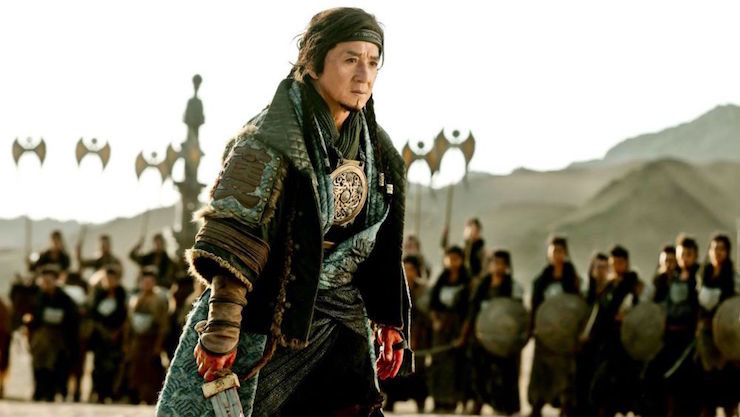Oh my god.
Did you know that in 2015 John Cusack and Adrien Brody made a movie with Jackie friggin Chan about a missing Roman legion along the fabled Silk Road?
Hell yeah it exists. It’s called Dragon Blade (dir. Daniel Lee). It is, as the opening titles say, a story “inspired by true events.”
Which means, of course, it is going to be entirely bonkers.
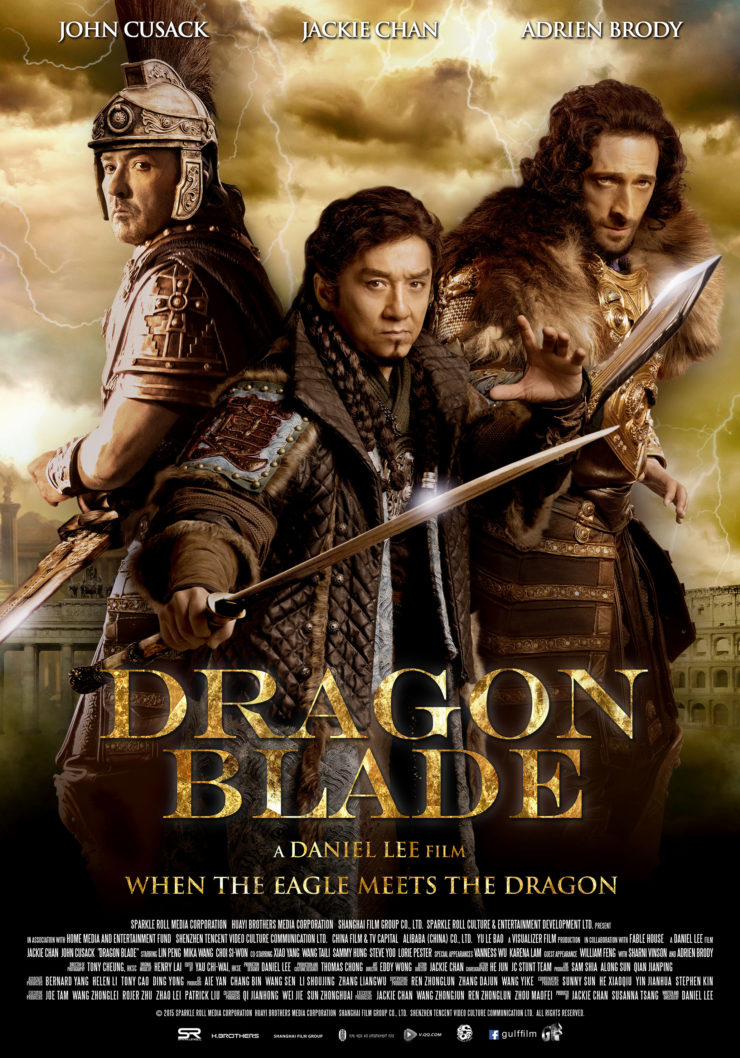
The plot … well, I’ve paused the movie about 15 minutes in and I can tell you that it’s the year 50 BC (thanks, opening titles!). A Roman legion commanded by headband-wearing John Cusack has randomly showed up at the gates of a decaying walled city in the desert somewhere on the Silk Road that’s commanded by some guy whose name I didn’t catch … and Jackie Chan is there and he’s a prisoner but he’s also apparently the head of a crack security team.
The previous 15 minutes of the movie, just so you know, have established that Chan is a really dynamite fighter but that at heart he’s a noble guy mostly devoted to diversity and peace and love, and he’s got a wife (I think she was his wife?) who teaches wee orphans, and this one time he had a really hot gal get naked in front of him because he beat her in a fight but he covered her up rather than be immodest and he’s like a perfect fella who is also the Producer of this film.
Oh, and the Romans have a really sick blind kid with them. I don’t know why.
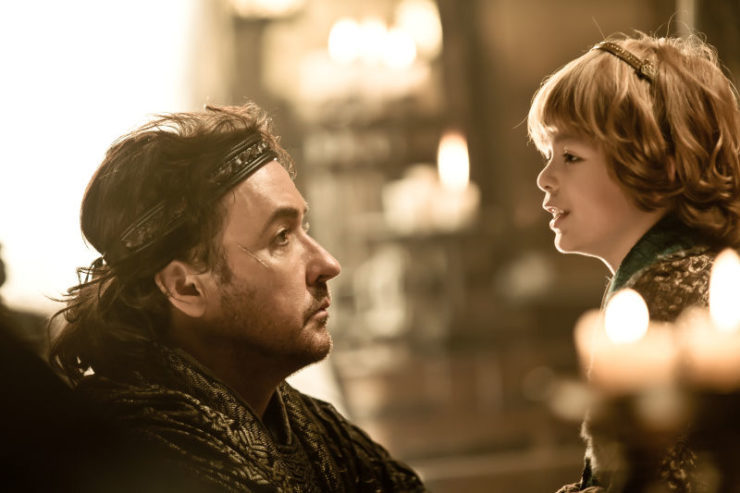
Honestly, I don’t know what the hell is going on and what it has to do with dragons and blades. Maybe Cusack will explain it. Give me a minute to unpause it.
Cusack has decided that the Romans need to perform a dispersed cavalry charge now. Against a walled city. I don’t know why he’s decided to do this. Perhaps he doesn’t know about the concept of “walls.”
Wow. So the folks in the desert city are inexplicably panicking like crazy. They’re running around on the walls—really high, really thick walls that horses can neither climb nor run through. I’m mighty confused.
Chan isn’t, though. In the face of all this terror, he snags some snazzy old armor that’s on display—I think it’s the armor of a dead general?—and goes forth to meet the Romans.
Oh, whew. Cusack just called for a halt. Smart man.
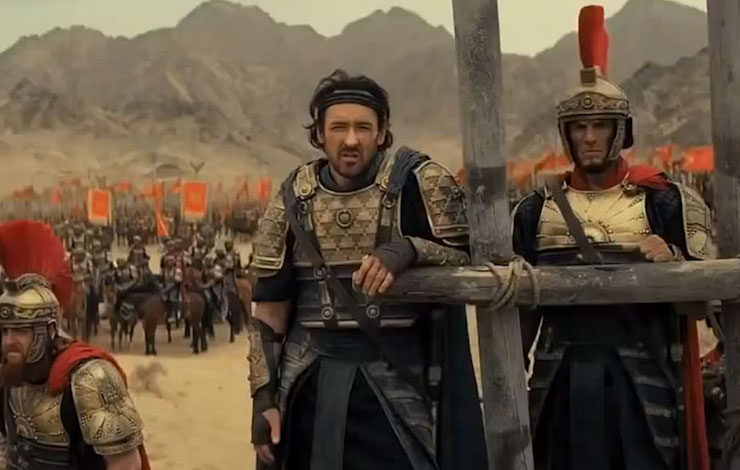
And so we get a mano a mano betwixt Cusack and Chan, who inexplicably can speak together. Not sure if we’re supposed to imagine them both speaking Latin or Mandarin or maybe English (with subtitles).
Right. So Cusack has told Chan that the legion is part of the Roman Empire. I’m slightly confused by this since there isn’t a Roman Empire for them to be a part of in 50 BC. A Roman Republic, yes. Most definitely.
The Roman Republic ended, for all intents and purposes, with Octavian’s defeat of Antony and Cleopatra at the Battle of Actium in 31 BC, though most folks date it to the year 27 BC, when Octavian became Augustus Caesar.
[Bonus book plug alert: the first two books in my historical fantasy series The Shards of Heaven span precisely this period. So, you know, if this sounds interesting to you…]
Anyway, I’m starting to wonder if Cusack and company are really time travelers from a Roman world post-Augustus—their armor is certainly a far cry from Republican garb—and the idea that this movie will also be a time-bender sounds like fun. Plus, surely at some point there will be a dragon blade…something. That should be cool.
Cusack and Chan fight, and I’ve got to be honest: it’s surprisingly solid choreography. I expect this from Chan, but (meaning no offense) I didn’t think Cusack could keep up. Also, the filmmakers do a good job of using the fight to show us how “East meets West” in the armor, armaments, and fighting styles … I mean, aside from the fact that neither man is wearing or using anything authentic.
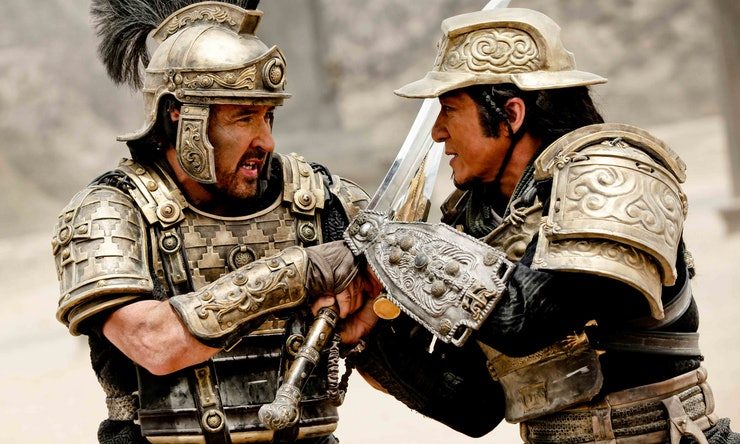
That said, while I still really don’t know what the plot is or when the dragon blade is gonna show up, I have to admit I’m starting to genuinely like this film. I think it’s going to be a very good bad film.
The fight is inconclusive, because a sandstorm is coming. Rather than leaving the Roman legion to die in it, Chan lets them into the city. Because, per above, he’s a really nice guy.
In the city, the sick blind kid gets hit with an acupuncture needle and is immediately healed.
Well, he’s still blind. Even mystic eastern medicine has its limits.
Also, it soon becomes clear that the Romans aren’t time-travelers and there probably isn’t going to be a dragon.
And thus we enter the middle part of the film, which is a kind of cultural buddy training montage. The Romans are just about to leave after the sandstorm when word arrives that the emperor has ordered that the decaying city be rebuilt in a crazy short amount of time. The task is impossible, except that the Romans decide to repay Chan’s kindness by introducing them to surveying and cranes and all measure of cleverness. The Chinese and the Romans start to work together and it’s marvelous and swell and you really shouldn’t think about the fact that the Romans are all working while wearing their legionary armor for no reason at all.
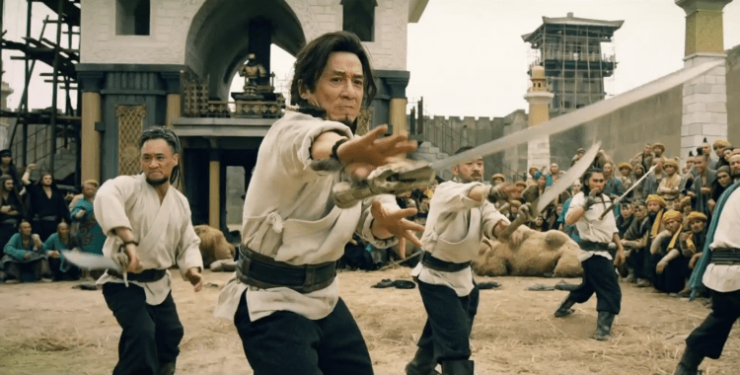
In the midst of all this, pretty much out of nowhere, we get a riff on the rumble from West Side Story: Chan and some buddies spontaneously decide to do some choreographed line-dancing … er, martial arts; the Romans respond by showing off their own legendary legionary line-dance choreography. Then we have mock-fights where it turns out that both their ways of fighting have advantages.
But it’s really about teamwork. I’m okay. You’re okay. And they’re all so inspired by this realization that they work together even better and the Romans give them concrete and together they finish the impossible task. Everyone celebrates, and everyone gets along, because life should be nice like that, damnit.
As this is all winding down, in fact, Chan is made an honorary centurion and we get a really long (5 minutes? 15 minutes?) sing-along of a Latin legionary hymn. That they spent so much time on this song was pretty wild, especially given that they didn’t spend very much time on, I dunno, helping anyone in the audience follow what’s happening and why.
Still, it was around this point that we finally got enough information (flashbacks! Within flashbacks!) to put together the plot.
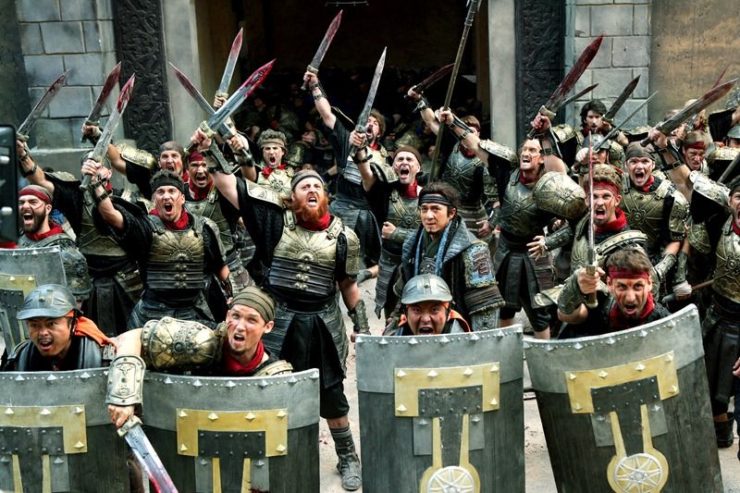
First, here are the true events that (ahem) “inspired” this movie:
In 53 BC one of the three most powerful men in Rome, Marcus Licinius Crassus (the other two members of this so-called First Triumvirate were Pompey and Caesar), decided to lead seven Roman legions on a campaign to attack Parthia. They ran into the Parthians in the Battle of Carrhae, and though the Romans had more numbers they were wholly unprepared for the cavalry tactics they faced. They got their asses kicked. Crassus was killed, Legionary Eagles were lost, and more than 10,000 Romans were taken prisoner. Those prisoners were sent east to the frontier city of Merv (in modern Turkmenistan), and there they disappear from history.
(In 1941, the historian Homer Dubs published a theory that these Roman prisoners survived by intermingling with the native populations and that they lie behind an obscure reference to 100 men fighting in a “fish-scale formation” at the Battle of Zhizhi in 36 BC. It’s a cool story, bro, but DNA and archaeological support for it is distinctly lacking. Alas.)
So this film speculates that after Crassus’ defeat at Carrhae there was a Roman consul who made a peace treaty with the Parthians. This fellow had two sons. The older one was named Tiberius (played by a scene-chewing Adrien Brody), and he killed his father and then blinded and poisoned his younger brother Publius in order to become consul. Unfortunately for Tiberius, this really awesome Roman general named Lucius (Cusack) discovered the plot and escaped with Publius and a few hundred loyal legionnaires. Fleeing Tiberius, they randomly ran into Wild Geese Gate (the walled city) and the noble Huo An (Chan), who is devoted to keeping the peace among all the peoples along the Silk Road.
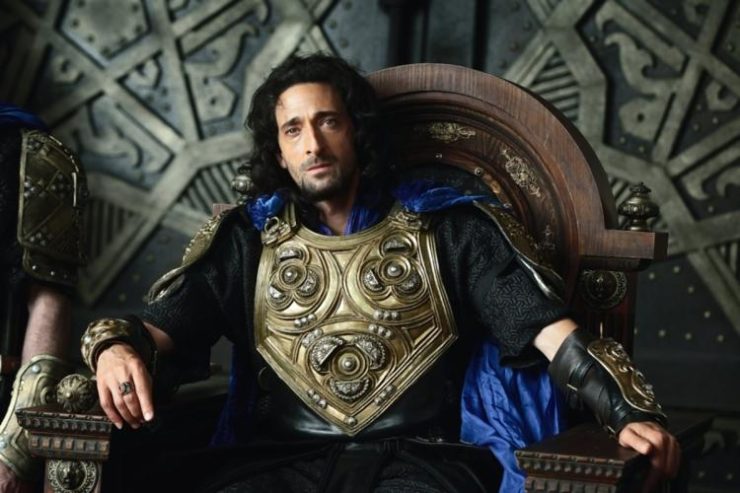
Surprising nobody, Tiberius eventually shows up with a vast army of “100,000” Romans. And all that stands between him and taking over the Silk Road will be Huo An, these scattered Romans, and the willingness of people to put aside their cultural differences in order to stand together for something. Well, that and the good karma of Huo An’s life of helping others leading to a payoff of a big battle at the culmination of the film that includes multiple armies from multiple nations… including an army of attack hawks that are trained to go for the eyes.
Not shitting you. A HAWK ARMY is part of the climax.
This is a movie that gleefully jumps the shark and then backs over it while Chan chops and jumps and talks about how we should all just get along.
It’s friggin’ marvelous.
In sum, I’ll tell you that the acting is pretty bad. The history is silly. The tone ranges from slapstick to musical to drama with little rationale. The editing is just plain confusing.
And no, the movie never explains where the hell the title comes from.
But you know what? I still enjoyed it. Just watch this trailer and try not to love it already.
Mike’s Medieval Ancient Ratings:
Authenticity: 1 of 7 Roman eagles.
Just Plain Fun: 8 of 10 line-dancing Jackie Chan leg kicks.
 Michael Livingston is a Professor of Medieval Culture at The Citadel who has written extensively both on medieval history and on modern medievalism. His historical fantasy trilogy set in Ancient Rome, The Shards of Heaven, The Gates of Hell, and the newly released The Realms of God, is available from Tor Books.
Michael Livingston is a Professor of Medieval Culture at The Citadel who has written extensively both on medieval history and on modern medievalism. His historical fantasy trilogy set in Ancient Rome, The Shards of Heaven, The Gates of Hell, and the newly released The Realms of God, is available from Tor Books.










